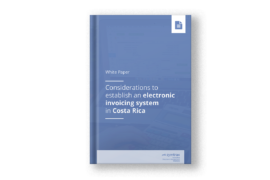Electronic invoicing comes with many advantages for businesses, but implementing it can be a complicated process. In Costa Rica, companies need to understand a variety of factors, including government requirements, digital invoice storage, and what makes an ideal provider, to get the largest benefit from e-invoicing.
As a government institution, for the Costa Rican Ministry of Finance, establishing a system for electronic invoicing was only a matter of time. Mexico, Brazil, Argentina, among other countries, have already established their respective methods to emit and receive fiscal documents. However, what benefits has such system brought them? In general, the electronic invoice process creates the standardization of the most important process of any company, which is to generate income. The State can now have almost instantly detailed sales data. Implementing rules of billing and payment improves the respective collection of taxes and an advance in strategies of control improving the determination of business income and prevent tax evasion.
Explore these and more related issues for Costa Rican business entities in this ebook:
- Why establish electronic invoicing?
- Important requirements
- Registration: How to register for E-invoicing and receive your digital signature
- Opting for the DGT or Central bank signature?
- Creating an official electronic document--the XML file
- Consequences for not establishing an adequate system
- The downside of free E-invoicing systems
- Providers with E-invoicing packages
- Storage for electronic invoices
- Not 100% satisfied with your e-Invoicing provider?
- What would be the ideal system to comply with your company requirements and those of the DGT?
